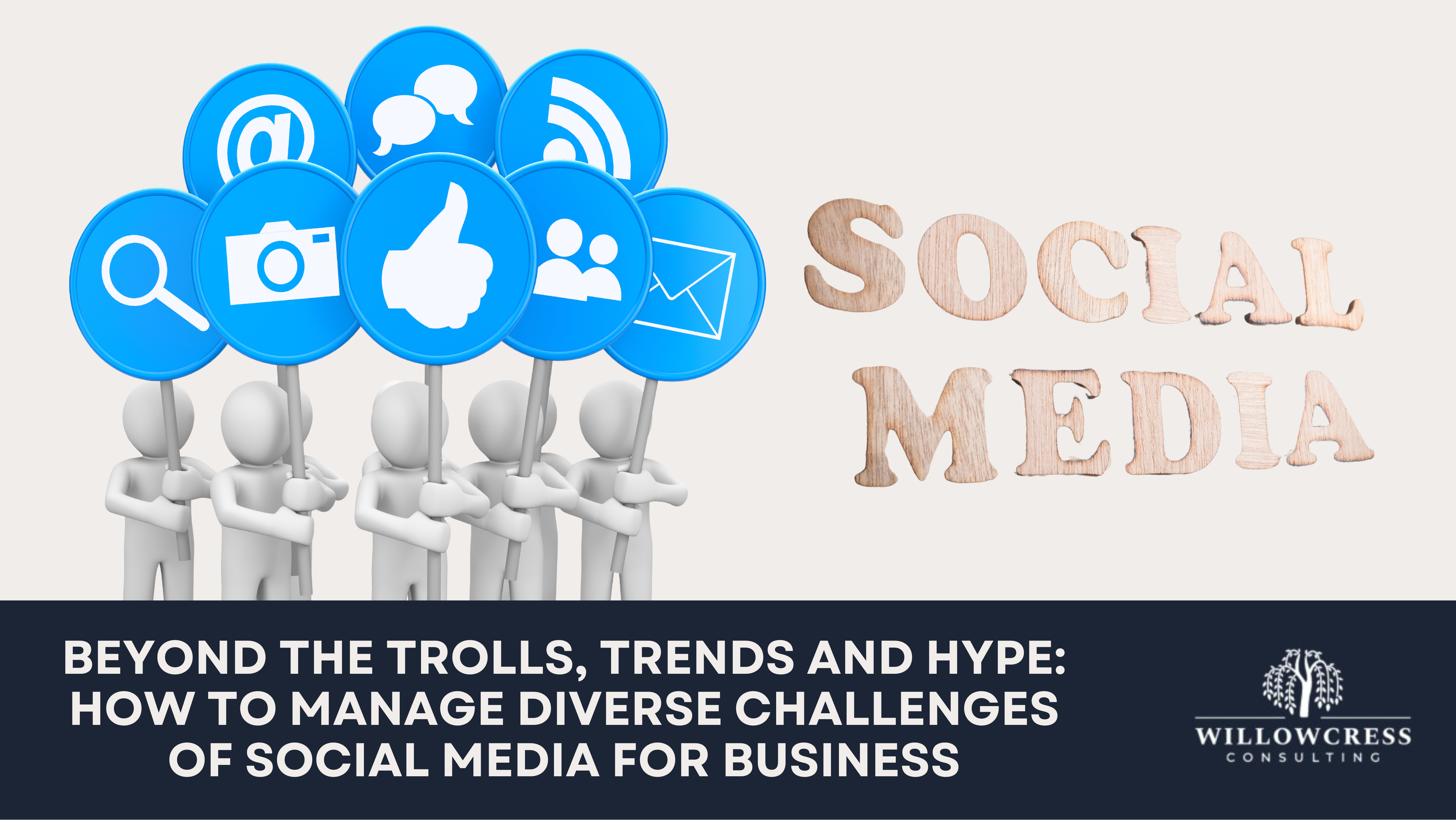Home / Social Media / Beyond the Trolls, Trends and ...

Social media represents a double-edged sword for businesses. On one side, it offers an unprecedented opportunity to reach and engage with a global audience, drive brand awareness, and generate leads. On the other hand, it presents significant challenges that can undermine these benefits if not managed effectively. The diverse nature of social media challenges for business—from negative interactions to security concerns—requires a strategic approach to harness the full potential of social media while mitigating risks. This blog post will explore the multifaceted challenges businesses face on social media and offer practical strategies to navigate them successfully.
Dealing with Trolls and Online Negativity
Social media platforms are breeding ground for trolls and negativity, including flaming, hate speech, and cyberbullying. These disruptive behaviors can damage a brand’s reputation and erode trust. To manage these social media marketing challenges, businesses need a robust strategy for monitoring and responding to negative interactions. This includes setting clear guidelines for acceptable behavior and ensuring that responses are timely, professional, and aimed at de-escalating conflicts.
Addressing Negative Reviews and Complaints
Negative reviews and complaints are inevitable but can be managed effectively with a proactive approach. Respond promptly and empathetically, offering solutions or resolutions where possible. A well-crafted response can demonstrate commitment to customer satisfaction and turn a potentially harmful situation into a positive reflection of your customer service.
Creating Engaging and Relevant Content
Consistency in content creation is crucial across various social media platforms. One of the social media marketing challenges of businesses is to develop content that resonates with their target audience while adapting to each platform’s formats and best practices. This includes crafting compelling social media posts, using visuals effectively, and maintaining a content calendar to ensure regular and relevant updates.
Maintaining Consistency in Voice and Messaging
While adapting to platform-specific formats, it’s vital to maintain a consistent brand voice and messaging. This helps build a recognizable brand identity, and fosters trust with your audience. Balancing this consistency with the need for platform-specific adjustments can be challenging, but it is key to effective social media management.
Fostering Active Audience Participation
Building a loyal community requires more than posting content; it involves actively engaging with your audience. Encourage participation through interactive content, such as polls and Q&A sessions, and promptly respond to comments and messages. This engagement helps nurture a sense of community and loyalty among your followers.
Understanding and Interpreting Data
Social media analytics tools provide valuable insights into the performance of your content and campaigns. Understanding these metrics—such as engagement rates, click-through rates, and follower growth—is essential for evaluating the effectiveness of your strategy. This data should guide your decisions and help you refine your approach to achieve better results.
Measuring the Effectiveness of Content and Campaigns
Regularly measuring the success of your content and campaigns allows you to identify what works and what doesn’t and this is one of the challenges that social media marketers constantly face. Use analytics to assess the impact of different content formats, social media post times, and campaign strategies. This information helps optimize future efforts and demonstrate your social media activities’ return on investment (ROI).
Demonstrating ROI
Proving the value of social media investments is crucial for securing continued support and resources. Track key performance indicators (KPIs) that align with your business goals, such as lead generation, conversion rates, and customer acquisition costs. Providing clear evidence of ROI helps justify your social media budget and strategy.
Protecting Sensitive Information
With the rise of cyber threats, protecting sensitive company information and customer data is a top priority. Implement robust security measures, such as strong passwords, two-factor authentication, and regular security audits, to safeguard your social media accounts and related data.
Maintaining Compliance with Data Privacy Regulations
Adhering to data privacy regulations, such as GDPR or CCPA, is essential for avoiding legal repercussions and maintaining customer trust. Ensure that your social media practices comply with relevant regulations and update your privacy policies as needed to reflect any changes in data handling procedures.
Educating Employees
Educating your team about responsible social media use and potential risks is vital. Provide training on best practices, security protocols, and how to handle sensitive information. This helps in mitigating the risk of accidental breaches or missteps that could harm your business.
A detailed social media policy guides your team’s online behavior and content creation. Outline your brand’s voice, content guidelines, and procedures for managing negative interactions. Establish clear expectations for employee conduct on social media to ensure consistency and professionalism.
Social listening tools can help you stay ahead of potential issues and track industry trends. By monitoring brand mentions and analyzing online conversations, you can identify emerging problems, gauge sentiment, and adapt your strategy accordingly.
A dedicated social media team combines strategic planning, content creation, community management, and analytics expertise. This specialized team can handle the diverse aspects of social media management, ensuring timely responses, effective engagement, and strategic oversight.
Utilize data-driven insights to inform your social media strategy. Conduct A/B testing to evaluate different content formats and posting schedules and use analytics to understand audience preferences. Set clear goals and objectives to measure success and refine your approach based on performance data.
Collaborating with influencers can extend your reach and enhance credibility. Identify influencers who align with your brand values and genuinely connect with your target audience. Work with them to co-create content or promote your products/services effectively.
Social media scheduling tools can streamline your content publishing process. They help maintain consistency across platforms, manage content calendars, and improve efficiency in your social media operations.
Social media is a dynamic field with constantly evolving trends and algorithm changes. Stay informed about industry best practices, platform updates, and emerging trends to keep your strategy relevant and competitive.
Managing the diverse social media challenges of social media requires a strategic approach and a commitment to continuous improvement. By addressing issues such as negative interactions, social media content management, analytics, and security, businesses can navigate the complexities of social media effectively. Implementing robust strategies, investing in the right tools, and building a dedicated team are essential steps toward leveraging social media for meaningful engagement and growth. Move beyond surface-level challenges and embrace the full potential of social media to drive your business forward.
Fill out the form below and we’ll give you a call to learn more about your goals and how we can help.
You can see how this popup was set up in our step-by-step guide: https://wppopupmaker.com/guides/auto-opening-announcement-popups/
